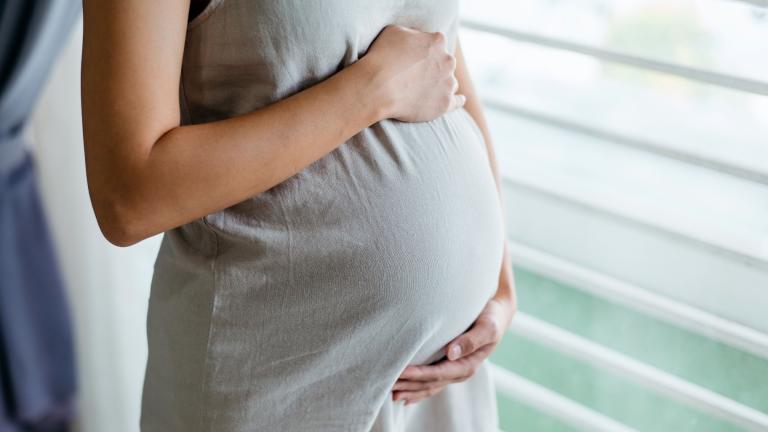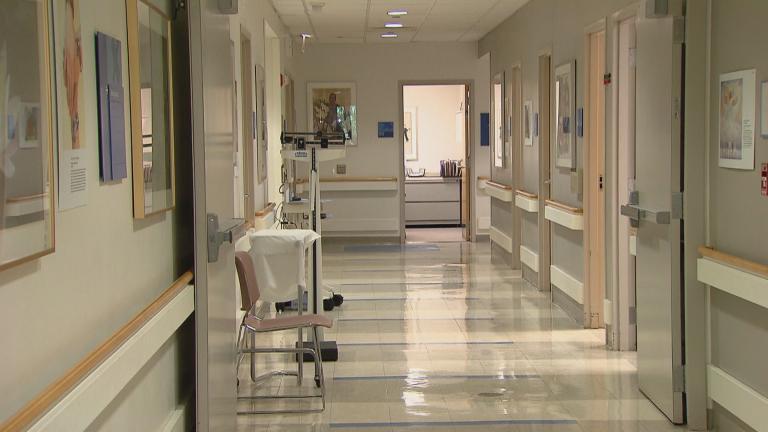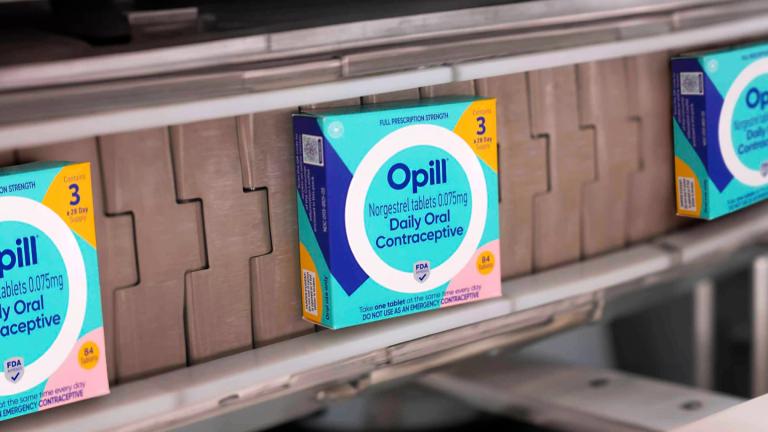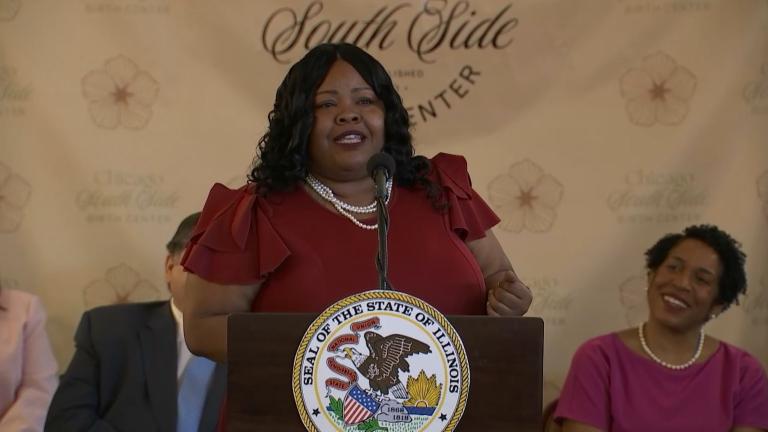Video: Joining “Chicago Tonight” are Dr. Erica Louden, reproductive endocrinologist and infertility specialist at Kindbody; Laurie Zoloth, professor of religious ethics at University of Chicago; Matthew Eppinette, executive director of the Center for Bioethics and Human Dignity at Trinity International University; and Rita Gitchell, special counsel to the nonprofit law firm the Thomas More Society. (Produced by Sean Keenehan)
Like many American medical terms, “in vitro” has Latin roots. The term roughly translates to “in glass.”
In the case of in vitro fertilization, an egg is fertilized in a tube or petri dish.
With a bang of the gavel, the glass is now showing cracks. The Alabama Supreme Court last month declared that frozen embryos created via IVF are people, stoking the already-fueled national debate over reproductive rights.
The increasingly popular path to parenthood has itself been put on thin ice, at least in Alabama, where some clinics paused IVF treatment for fear of legal repercussions.
That’s not so in Illinois, where Gov. J.B. Pritzker recently declared “IVF is protected.”
That’s outlined in the Reproductive Health Act, or RHA, a law (Public Act 101-0013) Pritzker signed in 2019 and added to in 2023 (Public Act 102-1117). It “sets forth the fundamental rights of individuals to make autonomous decisions about one’s own reproductive health.”
Because of the RHA, “there won’t be an Illinois Supreme Court that comes out and rules what Alabama did,” said lobbyist Stephanie Vojas Taylor, who helped draft those portions of the law.
Read More: Insurers Would Be Required to Cover Expanded Infertility Care Under Proposed Illinois Laws
People on both sides of the IVF discourse said it’s a more nuanced issue than abortion.
“Once you get into the pro-life movement, not everyone agrees that IVF is unethical,” said Illinois Right to Life director Mary Kate Zander. “I think that there is some variance in terms of the support that we would potentially get for something like that (a law classifying embryos as people).”
Vojas Taylor said anti-abortion advocates’ focus on regulating and restricting abortions, rather than fertility treatments, is purposeful.
“It’s so engrained in America that the pro-life/pro-choice argument is solely about abortion,” Vojas Taylor said. “It has been engrained that way for one reason, and one reason only — it’s a lot easier to claim it’s not about health care if we’re talking about making it this stereotypical image of women using abortion as birth control” and not about people who want to grow their families.
Even before the U.S. Supreme Court’s landmark Dobbs decision in 2022 that overturned the constitutional right to an abortion established in 1973 with Roe v. Wade, the focus of Illinois’ RHA was its protection of abortion.
But the law goes further, explicitly granting protections to IVF and other forms of assisted reproductive technology, or ART.
“A fertilized egg, embryo, or fetus does not have independent rights under the laws of this State,” the original law declared. “Every individual who becomes pregnant has a fundamental right to continue the pregnancy and give birth or to have an abortion, and to make autonomous decisions about how to exercise that right.”
“What the RHA did before was basically say an embryo is not a person, it has no personhood — but it was only in the context of abortion,” Vojas Taylor said of the 2019 law. She added that after the Dobbs ruling, the 2023 additions to Illinois’ Reproductive Health Act made it so that the state was shouting “if you need an abortion, you can come here. We love women.”
The attention was on what the law did for those who don’t want to be pregnant.
But tucked within were also provisions that had Illinois if not shouting, at least loudly proclaiming, that the state would also provide protections to those who want to become pregnant but can’t.
“What do you do with the (unused) embryos?” Vojas Taylor said. “Who decides what you do with the embryos that are left over, ensures that there’s no forced transfer? It’s all codified in the RHA.”
Prior to the RHA, Illinois was already on the vanguard of IVF laws.
To Vojas Taylor’s mind, “Illinois is the best state to have IVF in, because of insurance protections.”
“We actually have a pretty long history, a good statutory framework of IVF,” said state Rep. Kelly Cassidy, D-Chicago, who sponsored the RHA and was among the first to require insurers cover infertility treatment.
Cassidy is now advocating for a measure (House Bill 5152) that would give a tax credit to doctors or families who move to Illinois to provide or access reproductive or gender-affirming care.
In 2021, state Rep. Margaret Croke, D-Chicago, sponsored a measure that extended the ART mandate to same-sex couples and single parents over age 35 (Public Act 102-0170).
This session, Croke has introduced a proposal (House Bill 4112) to eliminate any cap on coverage of IVF cycles.
“For me, being pro-choice means being pro-family. I think that’s a component of being pro-choice. I want people to have the ability to have a family in whatever way that they want,” Croke said, whether that’s adopting, using fertility assists or having no children.
Other measures currently before the General Assembly call for insurers to cover elective egg freezing, preimplantation genetic screening and medicines that could aid fertility.
But the issue brought to the fore by the February Alabama court decision gets to the ability to pursue ART and autonomy over any resulting embryos.
That’s a basic tenant of the RHA, which defines protection for “assisted reproduction” and spells that out as “a method of achieving a pregnancy through the handling of human oocytes, sperm, zygotes, or embryos for the purpose of establishing a pregnancy. ‘Assisted reproduction’ includes, but is not limited to, methods of artificial insemination, in vitro fertilization, embryo transfer, zygote transfer, embryo biopsy, preimplantation genetic diagnosis, embryo cryopreservation, oocyte, gamete, zygote, and embryo donation, and gestational surrogacy.”
Specific and scientific language is necessary, Vojas Taylor said, because ART is “so complicated and so individualized.” She noted the fight to include specific protections for IVF was rooted in her own fight for a family.
After difficulty conceiving naturally, Vojas Taylor and her husband turned to IVF, which successfully made her the proud mom of two young boys.
It’s a struggle she said she wouldn’t wish on her worst enemy. She feels, however, she was possibly “meant to go through it” to raise awareness about the gaps in protection for IVF and other forms of ART.
Initially, Vojas Taylor said, there wasn’t widespread interest. Then came Dobbs.
The RHA expansion Pritzker signed last year was the opportunity, making “Illinois the first and only state that has protected, by statute, IVF and all of the other ART,” according to Vojas Taylor.
In addition to defining terms of ART, the RHA also updated the state’s Parentage Act to lay out that legal arrangements like consent forms at fertility clinics or marriage or divorce agreements determine what happens to unused frozen fertilized eggs, or parents who “no longer wish to use any remaining cryopreserved fertilized ovum for medical purpose.”
A WTTW News scan of legislation before the General Assembly didn’t turn up any proposal attempting to enshrine a principle like the Alabama court ruling into law, and Illinois Right to Life’s Zander said she was unaware of any state effort to define establish personhood for embryos.
While Zander said it’s horrible that anyone experiences infertility, she supports the Alabama ruling and would like to see the sentiment behind it adopted as law in Illinois. “We would absolutely support something like that in the state of Illinois — some sort of language that specifies that these fertilized eggs are human beings,” Zander said.
Contact Amanda Vinicky: @AmandaVinicky | [email protected]








